National Film Award for Best Supporting Actor
| National Film Award for Best Supporting Actor | |
|---|---|
| National award for contributions to Indian cinema | |
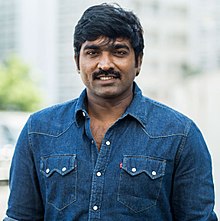 The 2019 recipient Vijay Sethupathi | |
| Awarded for | Best Performance by an Actor in a Supporting Role |
| Sponsored by | Directorate of Film Festivals |
| Reward(s) |
|
| First awarded | 1984 |
| Last awarded | 2019 |
| Most recent winner | Vijay Sethupathi |
| Highlights | |
| Most awards | Nana Patekar, Pankaj Kapur and Atul Kulkarni (2 times) |
| Total awarded | 36 |
| First winner | Victor Banerjee |
| Website | https://dff.gov.in/Archive.aspx?ID=6 |
The National Film Award for Best Supporting Actor, officially known as the Rajat Kamal Award for the Best Supporting Actor (Hindi pronunciation: [rədʒət̪ kəməl]), is an honour presented annually at India's National Film Awards ceremony by the Directorate of Film Festivals (DFF), an organisation set up by the Indian Ministry of Information and Broadcasting.[1] A national panel appointed annually by the DFF selects the actor who has given the best performance in a supporting role within Indian cinema.[1] The award is presented by the President of India at a ceremony held in New Delhi.[2]
The winner is given a "Rajat Kamal" (Silver Lotus) certificate and a cash prize of ₹50,000 (US$660).[a] Including ties and repeat winners, the government of India has presented a total of 32 Best Supporting Actor awards to 29 different actors. Although Indian cinema produces films in more than 20 languages,[4] the actors whose performances have won awards have worked in one or more of seven major languages: Hindi (17 awards), Tamil (9 awards), Bengali (3 awards), Malayalam (3 awards), Marathi (3 awards), Telugu (1 award), Kannada (1 award).
The first recipient was Victor Banerjee, who was honoured at the 32nd National Film Awards for his performance in the Bengali film Ghare Baire (1984).[5] As of the 2013 awards, three actors—Nana Patekar, Pankaj Kapur, and Atul Kulkarni—have been honoured twice. Patekar was awarded for the Hindi films Parinda (1989)[b] and Agni Sakshi (1996).[6] Kapur received the awards for his work in the Hindi films Raakh (1988) and Maqbool (2003).[7] Kulkarni was awarded for his performances in the Tamil / Hindi film Hey Ram (1999) and the Hindi film Chandni Bar (2001).[8] Paresh Rawal and Dilip Prabhavalkar have each won the award for two performances in a single year. Rawal received the award for his starring roles in the Hindi films Woh Chokri (1993) and Sir (1993) at the 41st National Film Awards, while Prabhavalkar won at the 54th National Film Awards for his performances in the Hindi film Lage Raho Munna Bhai (2006) and the Marathi film Shevri (2006).[9] At the 42nd National Film Awards, the award was tied between Ashish Vidyarthi and Nagesh, winning for their roles in the Hindi film Drohkaal (1994) and the Tamil film Nammavar (1994), respectively.[10] The most recent recipient of the award is Vijay Sethupathi, who was honoured at the 67th National Film Awards ceremony for his performance in the Tamil film Super Deluxe (2019).
List of recipients[]
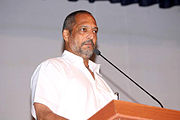


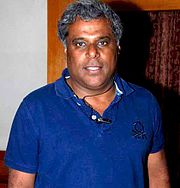
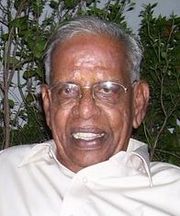
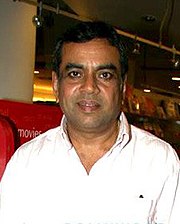

- Key
| Symbol | Meaning |
|---|---|
| Indicates a joint award for that year | |
| Indicates that the winner won the award for two performances in that year |
| Year[b] | Recipient(s) | Role(s) | Film(s) | Language(s) | Citation | Ref.[c] |
|---|---|---|---|---|---|---|
| 1984 (32nd) |
Victor Banerjee | Nikhilesh Choudhury | Ghare Baire | Bengali | – | [11] |
| 1985 (33rd) |
Dipankar De | Husband | Parama | Bengali |
For a convincing portrayal of anguish of a husband who is unable to accept his wife. |
[12] |
| 1986 (34th) |
Suresh Oberoi | Mukhi | Mirch Masala | Hindi |
For breathing life into complex feaudal character, who tries to control a destiny beyond his reach. |
[13] |
| 1987 (35th) |
Thilakan | Neduvancheril Achunni Nair (Mooppil Nair) | Rithubhedam | Malayalam |
For his sharp and incisive delineation of the immorality of a human being who is weak and mean. |
[14] |
| 1988 (36th) |
Pankaj Kapur | Inspector P. K. | Raakh | Hindi | – | [15] |
| 1989 (37th) |
Nana Patekar | Anna Set | Parinda | Hindi |
For his unique portrayal of a psychotic character. |
[16] |
| 1990 (38th) |
Nedumudi Venu | Maharaja Udayavarma Thampuran | His Highness Abdullah | Malayalam |
For maintaining the character with consistency and sensitivity. |
[17] |
| 1991 (39th) |
P. L. Narayana | Appala Nayudu | Yagnam | Telugu |
For convincing portrayal of the oppressed farmer. |
[18] |
| 1992 (40th) |
Sunny Deol | Govind Srivatsav | Damini – Lightning | Hindi |
For his outstanding portrayal of hardened and cynical lawyer who takes on new challenges in his quest for justice. |
[19] |
| 1993 (41st) |
Paresh Rawal | • Lalitram Mohan Roy • Velji |
• Woh Chokri • Sir |
Hindi |
For his performances in the films to reveal contradictory human emotions at the outer and inner levels. |
[20] |
| 1994 (42nd) |
Ashish Vidyarthi | Commander Bhadra | Drohkaal | Hindi |
For bringing credibility to his role with strength and total conviction. |
[21] |
| Nagesh | Prabhakar Rao | Nammavar | Tamil |
For making heart break of a broken father come alive with dignity and poise. | ||
| 1995 (43rd) |
Mithun Chakraborty | Ramakrishna | Swami Vivekananda | Hindi |
For his brilliant and soul searching portrayal of Shree Ramakrishna Paramahamsa and succeeds in elevating the character to a spiritual level. |
[22] |
| 1996 (44th) |
Nana Patekar | Vishwanath | Agni Sakshi | Hindi |
For his brilliant performance as an obsessed husband. |
[23] |
| 1997 (45th) |
Prakash Raj | Tamizhselvan | Iruvar | Tamil |
For his sensitive and consistent portrayal of a powerful character that spans a colourful political career. |
[24] |
| 1998 (46th) |
Manoj Bajpai | Bhiku Mhatre | Satya | Hindi |
For his flawless performance of the eccentric underworld figure trapped in a system, cold blooded yet vulnerable at the same time. |
[25] |
| 1999 (47th) |
Atul Kulkarni | Shriram Abhyankar | Hey Ram | Tamil |
For his serious performance as a cold blooded fundamentalist stalking the cities during the turbulent years of partition that led to the assassination of Mahatma Gandhi. |
[26] |
| 2000 (48th) |
H. G. Dattatreya | Hasanabba | Munnudi | Kannada |
For his portrayal of Hasanabba. He is an agent who procures local girls for arabs to marry in an impoverished village in Karnataka. H. G. Dattatreya brings a wonderful sensitivity to the character, without turning it into a stereotypical villain. |
[27] |
| 2001 (49th) |
Atul Kulkarni | Pothya Sawant | Chandni Bar | Hindi |
For depicting a ruthless character, trapped in a world without social values. |
[28] |
| 2002 (50th) |
Chandrasekhar | Lawrence [d] | Nanba Nanba | Tamil |
For his touching and absorbing portrayal of a physically challenged man. |
[30] |
| 2003 (51st) |
Pankaj Kapur | Jahangir Khan (Abbaji) | Maqbool | Hindi |
For his riveting yet understated performance as a mafia don. |
[31] |
| 2004 (52nd) |
Haradhan Bandopadhyay | Haradhan Bandopadhyay | Krantikaal | Bengali |
For his subtle yet powerful performance which is understated portraying a helpless bedridden old royal. |
[32] |
| 2005 (53rd) |
Naseeruddin Shah | Mohit | Iqbal | Hindi |
For his competent depiction of an endearing man who finds it difficult to give up his addiction to alcohol but still emerges vicarious as his protégé the young village lad conquers his dream. |
[3] |
| 2006 (54th) |
Dilip Prabhavalkar | • Mahatma Gandhi [e] • Clerk |
• Lage Raho Munna Bhai • Shevri |
• Hindi • Marathi |
For the sincere portrayal of a wide range of emotions of two divergent and equally challenging characters of Gandhi in Lage Raho Munna Bhai and a benign middle-class clerk in Shevri. |
[34] |
| 2007 (55th) |
Darshan Jariwala | Mahatma Gandhi | Gandhi, My Father | Hindi |
For truthfully portraying the angst of a great historical figure – Mahatma Gandhi. The Father of the Nation stands defeated in his personal relationship with his own son. |
[35] |
| 2008 (56th) |
Arjun Rampal | Joseph Mascarenhas (Joe) | Rock On!! | Hindi |
For his moving performance as a musician trying to rise above personal tragedy. |
[36] |
| 2009 (57th) |
Farooq Sheikh | S. K. Rao | Lahore | Hindi |
For the consummate ease with which he persuades and inspires everyone around him while retaining his integrity and dignity. |
[37] |
| 2010 (58th) |
Thambi Ramaiah | Ramaiah | Mynaa | Tamil |
For a heart-warming performance as a policeman who discovers the finer side of his own humanity in the process of capturing a fugitive. |
[38] |
| 2011 (59th) |
Appukutty | Azhagarsami | Azhagarsamiyin Kuthirai | Tamil |
For the sheer vitality in performance and credible characterization that Appukutty brings to the screen in portraying a truly unusual role. |
[39] |
| 2012 (60th) |
Annu Kapoor | Dr. Baldev Chaddha | Vicky Donor | Hindi |
As a medical professional running a fertility clinic, the actor has performed with panache, which forms the central core of the film. |
[40] |
| 2013 (61st) |
Saurabh Shukla | Justice Sunderlal Tripathi | Jolly LLB | Hindi |
For a heart-warming and exuberant performance as a judge, who discovers his authority and conscience in the process of conducting a high profile case. |
[41] |
| 2014 (62nd) |
Bobby Simha | Assault Sethu | Jigarthanda | Tamil |
For an engaging portrayal of a dreaded Mafia don who plays both the villain and the comic with a rare flamboyance and abandon. |
[42] |
| 2015 (63rd) |
Samuthirakani | Muthuvel | Visaranai | Tamil |
Minimalistic yet moving performance as a cop, caught in a moral dilemma. |
[43] |
| 2016 (64th) |
Manoj Joshi | Keshav | Dashkriya | Marathi |
For an accomplish portrayal of the character. |
[44] |
| 2017 (65th) |
Fahadh Faasil | Prasad | Thondimuthalum Driksakshiyum | Malayalam | – | [45] |
| 2018 (66th) |
Swanand Kirkire | Prasanna | Chumbak | Marathi |
For the ability to invoke empathy in the audience. |
[46] |
| 2019 (67th) |
Vijay Sethupathi | Shilpa (Manickam)[f] | Super Deluxe | Tamil |
For his challenging and convincing performance as a transgender. |
[47] |
See also[]
- List of Indian film actors
Footnotes[]
- ^ Before the 54th National Film Awards (2006), the cash prize was ₹10,000 (US$130).[3]
- ^ a b Year in which the film was censored by the Central Board of Film Certification.
- ^ The "Ref." cites the winner and the role played by them in the film. While there are some sources that are written in both English and Hindi, certain references are entirely in Hindi language.
- ^ Chandrasekhar played the role of a man suffering from tetraplegia.[29]
- ^ Dilip Prabhavalkar played the image of Mahatma Gandhi.[33]
- ^ Vijay Sethupathi played a man who undergoes gender transitioning.
References[]
- ^ a b "About National Film Awards". Directorate of Film Festivals. Archived from the original on 25 October 2011. Retrieved 8 November 2013.
- ^ "National Awards 2015, as it happened: Winners, wishes and morel". India Today. 3 May 2015. Archived from the original on 23 May 2015. Retrieved 21 May 2015.
- ^ a b "53rd National Film Awards" (PDF). Directorate of Film Festivals. pp. 32–33. Archived (PDF) from the original on 29 October 2013. Retrieved 19 March 2012.
- ^ "Central Board of Film Certification – Annual Report 2011" (PDF). Central Board of Film Certification. p. 33. Archived from the original (PDF) on 24 January 2013. Retrieved 5 July 2013.
- ^ Chakravarty, Riya (3 May 2013). "Indian cinema@100: 40 Firsts in Indian cinema". NDTV. Archived from the original on 4 May 2013. Retrieved 8 November 2013.
- ^ "Nana Patekar". Koimoi. Archived from the original on 24 October 2014. Retrieved 24 August 2014.
- ^ "Manoj Bajpai wins National Award". Sify. 17 August 2004. Archived from the original on 24 February 2014. Retrieved 15 December 2013.
- ^ Kumar, P. K. Ajith (27 February 2015). "Bitter-sweet encounters". The Hindu. Archived from the original on 12 March 2018. Retrieved 21 May 2015.
- ^ Jahagirdar-Saxena, Shraddha (12 June 2008). "Lage raho Rajubhai!". Daily News and Analysis. Archived from the original on 23 May 2015. Retrieved 21 May 2015.
- ^ "42nd National Film Awards". International Film Festival of India. Archived from the original on 23 May 2015. Retrieved 21 May 2015.
- ^ "32nd National Film Awards" (PDF). Directorate of Film Festivals. p. 14. Archived (PDF) from the original on 29 October 2013. Retrieved 6 January 2012.
- ^ "33rd National Film Awards" (PDF). Directorate of Film Festivals. pp. 26–27. Archived (PDF) from the original on 21 September 2013. Retrieved 7 January 2012.
- ^ "34th National Film Awards" (PDF). Directorate of Film Festivals. pp. 28–29. Archived (PDF) from the original on 29 October 2013. Retrieved 7 January 2012.
- ^ "35th National Film Awards" (PDF). Directorate of Film Festivals. pp. 30–31. Archived (PDF) from the original on 22 March 2012. Retrieved 9 January 2012.
- ^ "36th National Film Awards" (PDF). Directorate of Film Festivals. pp. 30–31. Archived (PDF) from the original on 4 November 2016. Retrieved 9 January 2012.
- ^ "37th National Film Awards" (PDF). Directorate of Film Festivals. pp. 36–37. Archived (PDF) from the original on 2 October 2013. Retrieved 29 January 2012.
- ^ "38th National Film Awards" (PDF). Directorate of Film Festivals. pp. 30–31. Archived (PDF) from the original on 15 December 2017. Retrieved 9 January 2012.
- ^ "39th National Film Awards" (PDF). Directorate of Film Festivals. pp. 40–41. Archived (PDF) from the original on 9 September 2016. Retrieved 27 February 2012.
- ^ "40th National Film Awards" (PDF). Directorate of Film Festivals. pp. 42–43. Archived (PDF) from the original on 9 March 2016. Retrieved 2 March 2012.
- ^ "41st National Film Awards" (PDF). Directorate of Film Festivals. pp. 38–39. Archived (PDF) from the original on 7 November 2017. Retrieved 3 March 2012.
- ^ "42nd National Film Awards" (PDF). Directorate of Film Festivals. pp. 28–29. Archived (PDF) from the original on 7 November 2017. Retrieved 5 March 2012.
- ^ "43rd National Film Awards" (PDF). Directorate of Film Festivals. pp. 28–29. Archived (PDF) from the original on 24 April 2012. Retrieved 6 March 2012.
- ^ "44th National Film Awards" (PDF). Directorate of Film Festivals. pp. 26–27. Archived (PDF) from the original on 7 November 2017. Retrieved 9 January 2012.
- ^ "45th National Film Awards" (PDF). Directorate of Film Festivals. pp. 28–29. Archived (PDF) from the original on 7 November 2017. Retrieved 11 March 2012.
- ^ "46th National Film Awards" (PDF). Directorate of Film Festivals. pp. 28–29. Archived (PDF) from the original on 7 November 2017. Retrieved 12 March 2012.
- ^ "47th National Film Awards" (PDF). Directorate of Film Festivals. pp. 28–29. Retrieved 13 March 2012.
- ^ "48th National Film Awards" (PDF). Directorate of Film Festivals. pp. 44–45. Archived (PDF) from the original on 29 October 2013. Retrieved 13 March 2012.
- ^ "49th National Film Awards" (PDF). Directorate of Film Festivals. pp. 34–35. Archived (PDF) from the original on 29 October 2013. Retrieved 14 March 2012.
- ^ Rangarajan, Malathi (1 August 2003). "Reapers of a happy harvest". The Hindu. Archived from the original on 27 August 2014. Retrieved 10 August 2014.
- ^ "50th National Film Awards" (PDF). Directorate of Film Festivals. pp. 36–37. Archived (PDF) from the original on 3 March 2016. Retrieved 14 March 2012.
- ^ "51st National Film Awards" (PDF). Directorate of Film Festivals. pp. 32–33. Archived (PDF) from the original on 7 January 2018. Retrieved 15 March 2012.
- ^ "52nd National Film Awards" (PDF). Directorate of Film Festivals. pp. 32–33. Archived (PDF) from the original on 29 October 2013. Retrieved 28 January 2012.
- ^ "His moment under the sun!". The Hindu. 15 September 2006. Archived from the original on 12 March 2018. Retrieved 21 May 2015.
- ^ "54th National Film Awards" (PDF). Directorate of Film Festivals. pp. 30–31. Archived (PDF) from the original on 29 October 2013. Retrieved 24 March 2012.
- ^ "55th National Film Awards" (PDF). Directorate of Film Festivals. pp. 36–37. Archived (PDF) from the original on 29 October 2013. Retrieved 26 March 2012.
- ^ "56th National Film Awards" (PDF). Directorate of Film Festivals. pp. 38–39. Retrieved 27 March 2012.
- ^ "57th National Film Awards" (PDF). Directorate of Film Festivals. pp. 70–71. Archived (PDF) from the original on 3 March 2016. Retrieved 28 March 2012.
- ^ "58th National Film Awards" (PDF). Directorate of Film Festivals. pp. 82–83. Retrieved 29 March 2012.
- ^ "59th National Film Awards for the Year 2011 Announced" (Press release). Press Information Bureau (PIB), India. Archived from the original on 31 October 2014. Retrieved 7 March 2012.
- ^ "60th National Film Awards Announced" (PDF) (Press release). Press Information Bureau (PIB), India. p. 4. Archived (PDF) from the original on 11 June 2014. Retrieved 18 March 2013.
- ^ "61st National Film Awards" (PDF). Directorate of Film Festivals. 16 April 2014. p. 3. Archived from the original (PDF) on 16 April 2014. Retrieved 16 April 2014.
- ^ "62nd National Film Awards" (PDF) (Press release). Directorate of Film Festivals. 24 March 2015. Archived (PDF) from the original on 2 April 2015. Retrieved 24 March 2015.
- ^ "63rd National Film Awards" (PDF) (Press release). Directorate of Film Festivals. 28 March 2016. Archived (PDF) from the original on 7 October 2016. Retrieved 28 March 2016.
- ^ "64th National Film Awards" (PDF) (Press release). Directorate of Film Festivals. Archived from the original (PDF) on 6 June 2017. Retrieved 7 April 2017.
- ^ "65th National Film Awards" (PDF) (Press release). Directorate of Film Festivals. p. 21. Archived from the original (PDF) on 6 June 2017. Retrieved 13 July 2017.
- ^ "66th National Film Awards" (PDF). Directorate of Film Festivals. Retrieved 9 August 2019.
- ^ The Hindu Net Desk (22 March 2021). "67th National Film Awards: Complete list of winners". The Hindu. ISSN 0971-751X. Retrieved 22 March 2021.
External links[]
- National Film Awards (India)
- Film awards for supporting actor